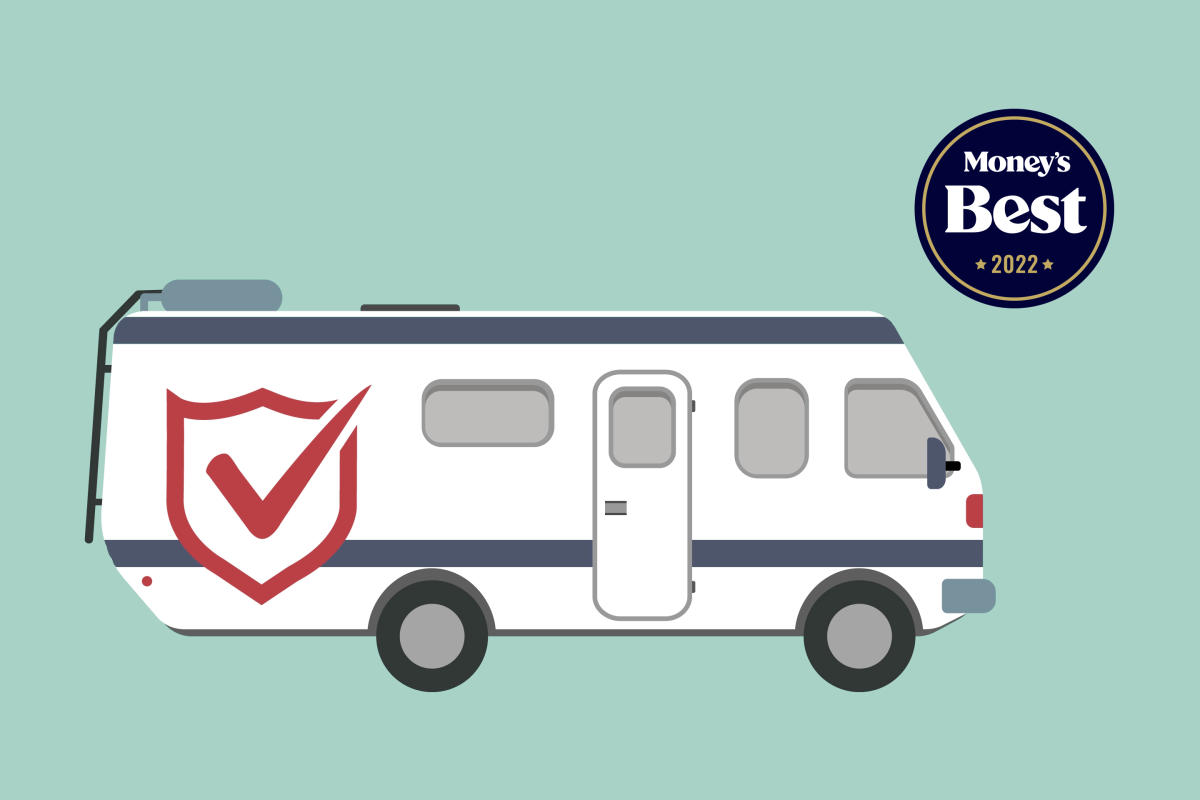Personal Finance
6 Best RV Insurance Companies of 2023

Our Partners
Top Partner
Our Partner
See an Estimate
-
96% overall customer satisfaction rating
-
Customers report average savings of $530 per year
-
Total-loss replacement for motorhomes and travel trailers
-
Specialized coverage for full timers or first-time weekend RV’ers
-
RV storage option allows you to save even more by turning off coverage when your RV is not in use!
Our Partner
See an Estimate
-
Customers report average savings of $321 per year
-
Covers everything from class A motorhomes to pop-up campers
-
Quote and buy online
-
Speak to a professional, licensed agent
-
Fully licensed, multi-line agency can quote your auto, home, boat and other insurance products
Our Partner
See an Estimate
-
Top rated C=choice: A+ BBB rating
-
“Turn Off” for liability & collision during storage – Save 53%
-
Cover your personal belongings or attachments
-
Full-timer coverage options
-
Mexico insurance options
-
Total Loss RV replacement
-
24-hour claims support
Our Partner
See an Estimate
-
Coverage when you rent your RV, without a commercial policy
-
Covers DIY and professional conversions
-
File a claim online, via e-mail, or by phone
-
Extensive FAQ and informational content
-
Accredited and rated A+ by the Better Business Bureau
Insuring your RV is essential, whether you plan to live in your RV full-time or use it for occasional trips.
Like auto insurance, an RV insurance policy provides financial protection in the event of accidents, injuries and other unfortunate scenarios. This means it can reimburse you for repairs, hospital bills and offer liability protection in the event you injure someone or damage their property.
Read on for our list of the best RV insurance companies and learn how to choose the coverage that fits your needs.
Our Top Picks for the Best RV Insurance Companies
-
Good Sam – Best RV Insurance Agency
-
Nationwide – Best for Multiple Discounts
-
National General – Best for Full Replacement Cost Coverage
-
Progressive – Best for Disappearing Deductibles
-
Roamly – Best for Renting Out Your RV
-
Auto-Owners Insurance – Best for Customer Service
Best RV insurance reviews
Pros
-
Offers full-timer coverage
-
Manage your policy online without having to contact an agent
-
Membership gets you discounts on campsites, gear stores, fuel and more
Cons
-
Not a direct insurer
Why we chose this company: Good Sam Insurance Agency is the best option for those who need help choosing coverage. It connects you with some of the best RV insurance companies and helps you get a comprehensive policy that fits your needs.
Good Sam works with well-known insurance companies like Progressive, Foremost, SafeCo and National General. Some standard insurance options you can get through Good Sam include comprehensive, collision, liability, property damage and personal injury protection.
Other add-ons include full replacement cost, personal belongings and emergency expenses. The agency can even help you customize a full-time RV insurance policy if you use it as a permanent residence.
Good Sam is also an excellent option for people who drive their RV across the border to Mexico. The company partners with MexicoInsuranceOnline.com, which can pair you with one of three Mexico-based insurers. Agents can recommend add-ons for your cross-border travels based on your specific needs, and you can purchase policies for a single-day trip or longer.
The company also offers a storage discount, which lets you pause collision and liability coverage when your motorhome or trailer is stored for more than 30 consecutive days. This can help you save on monthly premiums if you only use your RV for occasional road trips.
Why we chose this company: RVInsurance.com can help you find a suitable policy, whether you use your RV for vacationing or as your residence.
Pros
-
Specialists can help you find a policy
-
Policies available for all types of RVs
Cons
-
Not a direct insurer
RVInsurance.com works with Foremost, National General and Safeco. These companies cover all types of RVs, from motorhomes to campers. They offer several policy add-ons, such as full replacement cost, full-timer’s liability coverage and roadside assistance.
You can get an insurance quote online, but an insurance specialist can help you compare policies if you call.
Pros
-
Free yearly insurance review to evaluate your coverage options and possible discounts
-
Optional towing coverage includes lodging, transportation and meals
-
Multiple policies available, making it easy to bundle and save
Cons
-
Quotes not available online
Why we chose this company: Nationwide Insurance offers over 10 different discounts, including discounts for staying claim-free during the previous policy period or installing safety devices, like smoke detectors.
Most RV insurers offer discounts that can help you save on premiums. Nationwide’s discount list, however, is particularly extensive.You can save money if you bundle your RV policy with your existing home insurance, take safety courses, belong to an RV organization (such as the National RV Association), pay your annual policy upfront or purchase the company’s Full Timer’s package.
Note that not all discounts are listed on Nationwide‘s website, and some only come up during the quoting process. For example, according to a customer service representative, they also offer other discounts for installing safety features such as a tire-pressure monitoring system or a fiberglass body.
Their standard policy includes liability, collisions, medical payment, uninsured/underinsured motorists and comprehensive coverage. Additional endorsements include roadside assistance, towing and labor, vacation liability, safety glass replacement, replacement costs and Mexico coverage.
Pros
-
Coverage for specialized equipment such as solar panels
-
Pause your coverage when your RV is in storage
-
Experts help you find a new RV in the event of total loss
-
Low mileage discount
Cons
-
Eligibility, benefits, coverage and discounts vary per state
-
Limited information about policies in their website
Why we chose this company: Full replacement cost coverage can usually only be bought during an RV’s first model year. National General, on the other hand, lets you get the rider within an RV’s first five model years.
With full replacement cost coverage, also known as total loss replacement, your RV gets replaced with a new or similar one if it’s totaled or stolen. You might also get reimbursed for the original purchase price of the vehicle.
This type of coverage is typically only available for newly purchased motorhomes or travel trailers up to one or two model years old. For example, a 2023 model would probably be eligible until 2025. So if you buy a used RV or don’t insure your new one as soon as possible, you risk your vehicle being considered ineligible.
With National General, on the other hand, RVs are eligible during their first five model years. The company can also insure your RV whether you’re the first owner or not — some companies limit this type of coverage to original owners.
The company lets you pause your coverage when your RV is in storage, an option that’s not available with many other providers. You can save money by suspending collision and personal injury riders, for example. However, your RV would still be covered against theft, fires, harsh weather and other non-collision accidents.
Pros
-
Accident forgiveness for claims under $500
-
Horse trailer coverage up to $50k
-
Pet injury coverage available
-
Add-on coverage available for roof malfunction
Cons
-
Standard plan doesn’t include replacing personal belongings or emergency expense coverage
-
Insurance rates can vary if you buy online or through an agent
-
Discounts not available in all states
Why we chose this company: Progressive offers disappearing deductibles, accident forgiveness and an extensive array of discounts.
With Progressive, you can save on premiums if you’re the RV’s original owner or if you pay your policy in advance, amongst other discounts. However, what makes Progressive’s discount list stand out are disappearing deductibles and accident forgiveness.
Not many companies provide these discounts, and if they do, they only offer one or the other. With disappearing deductibles, the longer you go without filing a claim, the lower your insurance deductibles get.
Progressive deducts 25% from your total deductible amount for every claim-free policy period. After four consecutive claim-free periods, your deductible will be $0. Other insurance companies that offer disappearing deductibles cap the discount to a maximum of $500 — if your deductible exceeds $500, you’d still have to pay the remaining amount.
Disappearing deductibles, also known as vanishing deductibles,have an additional cost. However, the feature is included if your vehicle is valued at $25,000 or more and you purchase the comprehensive and collision coverage package. Both riders are recommended since they ensure the vehicle is covered for car accidents and non-collision events, like a fire.
Accident forgiveness — which keeps your premium rates from increasing if claims are for $500 or less — is included at no additional cost.
Pros
-
Specializes in RV insurance
-
Coverage even when renting out your RV
-
Policies available for full-time RVers
-
Covers Canada rentals
Cons
-
Only offers RV policies
Why we chose this company: Insurers typically decline coverage if you rent your RV to someone else. With Roamly, you can rent out your RV and still be covered for liability and damage to the vehicle.
Rented RVs require comprehensive commercial insurance because they’re exposed to more risk than personal vehicles. Renting out your motorhome or camper without insuring it can result in denied claims, especially if the renter doesn’t have coverage either.
With Roamly, your RV is always covered when listed in rental platforms like Outdoorsy (which owns Roamly). When someone books your RV through Outdoorsy, they can purchase a renters protection package. These policies can include trip protection, interior damage and travel medical insurance.
Roamly covers rented RVs for actual cash value during a rental period. Also, policies include $1 million in liability insurance protection during each trip.
Pros
-
Premium reduction if RV is equipped with certain safety features
-
Towing and roadside assistance in all 50 states and Canada
-
Mobile app for Apple and Android
Cons
-
No online quotes
Why we chose this company: Auto-Owners is our pick for the best personalized customer service because of its network of independent agents, online customer center and mobile app. Customers can access claims, billing, and other important policy documents on their phone, tablet or computer.
Auto-Owners has an impressive customer service record, with fewer complaints on record with the National Association of Insurance Commissioners (NAIC) than most competitors. It also ranked above average in the southeast region in J.D. Power’s 2022 Auto Insurance Customer Satisfaction study.
Unlike other companies, Auto-Owners only sells its insurance products through independent agents. Instead of contacting the company online, you work directly with local agencies which can better advise you regarding specific insurance requirements in your area. For example, bodily injury and property damage liability limits set by law vary by state.
Auto-Owners offers various discounts for being a multi-policy holder, making on time for the past 36 months and paying the annual premium in full. Other discounts are available when you enroll in paperless billing, take a driver safety program or are over 50. Like most insurers, they also offer lower premiums for those with a favorable loss history — that is, with no recent claims or at-fault accidents.
Other RV Insurance companies we considered
During our research for the best recreational vehicle insurance providers, we narrowed down our initial list to 11 companies. The following didn’t make our final cut, not because they were lacking, but rather because other competitors stood out more.
AAA
Pros
-
Covers motorhomes, travel trailers, and campers
-
Membership plan includes roadside assistance, hotel discounts and more
-
Extra coverage for lodging and transportation if your RV is damaged
Cons
-
Coverage options are not standard across regions (southwest, northeast, etc.)
-
RV policy not available nationwide
-
Limited information available online
AAA offers coverage for different types of RVs and some of its policies also cover personal effects such as electronics, however it didn’t make our list because their coverage is not available in all 50 states.
Allstate
Pros
-
Discount if you transfer from another insurance company
-
Discounts for drivers 55 years or older
-
Gas price locator to help you find the cheapest gas
Cons
-
Limited information on company website
-
Online quotes not available
Allstate’s policies include emergency travel expenses if you’re over 50 miles from home when your RV breaks down and the issue is covered under the policy. Allstate is not on our main list because it only provides quotes through their sales agents and the information on the website is limited.
Geico
Pros
-
Windshield deductible covers repairs and charges only $50 for total replacements
-
Personal effects replacement limits up to $100,000
-
Free accident forgiveness for drivers who have been accident-free for 5 years or more
Cons
-
Limited information available on company website
-
Enhanced RV coverage available in all states except HI, MA, MI, and NC
-
Total loss replacement coverage availability may vary by state and vehicle value
While Geico offers similar coverages to others on our list (such as total loss replacement, emergency expenses coverage and vacation liability), a drawback to their coverage is that it’s not available nationwide. Also, its website is missing valuable information for consumers, such as available discounts.
Safeco
Pros
-
Loan or lease protection coverage available
-
Deductibles diminish $100 per year up to $500
-
Insures motorhomes valued at up to $1 million
-
Coverage available for custom equipment
Cons
-
Only covers vehicles used 250 days or less per year
-
Limited information available on website
-
No online quotes available
Safeco offers coverage for class A, B, and C motorhomes valued at up to $1 million, but it only insures these vehicles if you use them recreationally. Safeco didn’t make our list because they have limited information available online and their coverage is limited to vehicles used less than 250 days a year.
Foremost
Pros
-
Coverage for emergency expenses if camper is damaged or destroyed
-
Pays for transportation of damaged RV to storage, repair shop or home
-
Full-timer coverage for travel trailers, motor homes, luxury motorcoaches and more
-
Special policies for USAA members
Cons
-
Not available in DC or Hawaii
-
Limited information on website
Foremost, a subsidiary of Farmers Insurance, has policies for full-timers as well as stationary travel trailers. It also covers personal-use motor homes that you occasionally rent, lease or loan. Unfortunately, this policy doesn’t cover the vehicle while it’s rented, leased or loaned.
Farmers
Pros
-
Part-time users can opt for storage-only insurance during the off-season
-
Policy extends to travel anywhere in Canada
-
Insures equipment permanently attached to your RV
Cons
-
No information regarding discounts
-
No online quotes
While extending its coverage to Canada is a unique feature, Farmers didn’t make our list because its website only provides basic information on its coverages and discounts making it difficult for consumers to get an idea of what its policies offer.
USAA
Pros
-
Discounts for safe driving and original ownership
-
Multi-vehicle discount
-
Coverage for all RV classes, including slide-on campers
-
Members get a 5% discount on policies
Cons
-
Policies only available to military families
-
5% members-only discount not available in all states
USAA offers RV insurance through what an alliance with Progressive which covers almost all types of RVs. The drawback to USAA’s policies is that they’re only available for military families.
Country Financial
Pros
-
Multi-policy discount
-
Mobile app for Apple and Android devices
Cons
-
Only available through agents
-
Operates in only 19 states
-
Limited information available on website
The RV insurance policies that Country Financial offers fall under their home or auto insurance policies. This can be a drawback for consumers who already have a preferred auto or home insurance. Another notable snag in its coverage is that it’s available in only 19 states.
National Interstate
Pros
-
Options for RV full-timers
-
25% off deductibles for each consecutive claim-free year
-
Windshield replacement coverage
-
Coverage for commercial RVs
Cons
-
Only available through agents
-
Website lacks information about terms and discounts
National Interstate has policy options for RV full-timers and covers commercial RVs. This provider is not featured on our main list because they don’t have details on their policies and discounts online.
The Hartford
Pros
-
Lifetime guarantee for repairs done in authorized repair shops
-
24/7 claims submission
-
RV replacement if it’s totaled in the first 15 months
Cons
-
Only available for AARP members
-
Not available in U.S. territories
The Hartford allows customers to customize their coverage of RV insurance. Its lifetime guarantee for repairs in authorized shops is a highlight of their policies. However, only being available for AARP members is a drawback.
RV Insurance Guide
Most RV insurance providers offer comprehensive policies covering everything from collision, theft, personal belongings, medical expenses and more. However, not everyone needs an all-inclusive policy, especially those who use their RVs sparingly.
Read on to learn about the different types of riders available and tips on choosing the best coverage for your needs while saving on monthly premiums.
Types of RVs
Recreational vehicles, more commonly known as RVs, can be classified into one of four categories: Class A, Class B, Class C, and towable RVs. The first three are motorhomes, which means they’re drivable units equipped with living quarters and appliances. Towable RVs, also called campers or trailers, can have home amenities too. However, some are designed to transport animals or cargo.
Here’s the rundown of the different types of RVs available:
Class A motorhomes
Class A motorhomes are the most luxurious and spacious. They are similar to commercial buses, measuring anywhere between 24 to 45 feet in length and fitting as many as 12 passengers. However, their size can make them difficult to drive and limits their mileage to around 10 or less miles per gallon.
Class B motorhomes
Class B motorhomes, also known as “camper vans,” are the smallest and least expensive type, with a length of 17 to 19 feet. These are standard-sized vans usually packed with a compact kitchen, bathroom and foldable or fixed bed. Their limited living space makes them suitable for four passengers or less who enjoy minimalist traveling.
Class B+ or B Plus motorhomes
Class B+ or B Plus motorhomes are the big siblings of Class B camper vans. These vehicles measure between 17 and 30 feet, fitting bigger beds and more spacious bathroom and kitchen areas.
Class C motorhomes
Class C motorhomes are the middle ground between Class A and B RVs. They measure between 21 to 41 feet in length and are easily recognized by their over-cab sleeping or storage area.
Although smaller than Class A RVs, Class Cs are suitable for full-time occupancy,delivering better gas mileage and easier maneuverability. These vehicles can fit up to eight passengers and include a fully equipped kitchen and spacious dining, bathroom and living room areas.
Towable RVs
Towable RVs are pulled by hitches on SUVs, pickup trucks or any vehicle that can tow the RVs weight. Towable RVs that feature living quarters include fifth wheels, toy haulers, travel trailers and pop-up campers. These range from under 10 feet for pop-ups to 30 feet for fifth-wheel trailers.
Truck campers are also considered towable RVs, but a hitch doesn’t pull these. Instead, they sit on the bed of a pickup truck. Other types of towable RVs include utility, cargo and horse trailers.
Types of RV Insurance
Since RVs can be both a vehicle and a primary residence, there are special considerations when insuring them. Some policies only offer basic liability protection; others are broader and include personal effects and emergency expenses coverage.
Keep in mind that you should, at least, have liability coverage that meets your state’s minimum liability insurance requirements if your RV is self-propelled. This applies whether the vehicle is used occasionally or as a residence.
If your RV is towable, the insurance of the vehicle used to tow it might extend to the RV. However, note that the towing vehicle’s policy usually only covers liability and not physical damage to the RV or attached accessories.
Best RV insurance features for part-time RVers
People who use their motorhomes for weekend getaways should at least have basic liability coverage that meets their state’s minimum requirements.
Other worthwhile add-ons for part-time RVers are:
-
Property-damage liability coverage: Pays for damages that you cause to another person’s property or vehicle.
-
Bodily injury liability coverage: Helps pay for medical expenses and to those you injure in an at-fault accident.
-
Collision coverage: Covers repair to your RV after an accident with another vehicle, whether you’re at fault or not.
-
Comprehensive coverage: Pays for damages caused by theft, vandalism, natural disasters or fire and other non-collision accidents.
-
Uninsured/Underinsured motorist coverage: Covers the cost of repairs to your RV and medical payments if you’re in an accident caused by a driver that doesn’t have insurance or who has insufficient coverage to pay your claim.
-
Personal Injury Protection (PIP): Covers medical expenses for both you and your passenger in the event of an accident, no matter who was at fault. It also covers lost wages.
-
Campsite/vacation liability coverage: Helps pay for legal expenses if you’re found at fault for the injuries suffered by a non-family member while in your campsite area or inside your RV.
-
Roadside Assistance: Offers around-the-clock repairs, towing, and emergency assistance should your RV experience a flat tire, battery discharge, or other malfunction.
Best RV insurance features for full-time RVers
Full-time RVers should consider having a more comprehensive policy that includes the above mentioned add-ons, as well as these:
-
Personal property coverage: Covers the cost of replacing any damaged or stolen personal effects. This includes clothing, furniture, jewelry and computers, for example.
-
Total loss replacement: Replaces your RV with an equal or similar model if your vehicle is ever stolen or totaled in an accident. In other cases, the insurer might reimburse you the original purchase price. Note that lenders might require this coverage if you finance your RV.
-
Full-time RV liability coverage: Adds extra liability, and medical expenses coverage if you live in your RV for six months or more each year.
-
Emergency expense allowance: Covers living and travel expenses like car rentals, lodging and food for up to a specified amount if your RV leaves you stranded, usually more than 100 miles away.
-
Specialized coverage: Can replace appliances like awnings, satellite dishes, and solar panels and can even provide coverage for any pet injuries that happen in the vehicle.
-
Loss assessment: Helps pay for fees charged by RV associations for damage to common areas in a campsite, for example.
How to Buy RV Insurance
Take time to shop around for insurance quotes
The cost of RV insurance varies depending on your driving history, the state where you live, the vehicle type and whether you intend to live in the RV full-time or use it for vacations. Additional coverage options like pet and accessories insurance will hike up your premium.
Requesting multiple RV insurance quotes can work out to your advantage. Those who compare estimates and coverage options before choosing often find the best rates.
If you don’t have the time to shop around, you can consult with an independent insurance agent. They’ll usually provide insights and guide you toward companies with attractive rates and policy features that meet your needs.
Consider bundling multiple policies
Most insurance providers offer a multi-policy discount when you combine your RV insurance with other qualified policies.
You can save on premiums by combining your RV’s policy with your current auto, home or boat insurance. Some insurers also let you bundle your policy with renters or life insurance policies. Bundling multiple policies under one provider can also lessen the hassle of dealing with different companies for claims.
If you don’t want to pay two premiums, you can consider adding your RV to your existing auto insurance policy. However, a car’s coverage usually extends only to towable campers or trailers, not motorhomes. Also, keep in mind that car insurance might cover damages to the RV and liability but not belongings or appliances inside the RV.
Homeowners insurance might also offer some coverage for RVs, but only when the vehicle is parked on the insured property’s premises.
Another option is getting umbrella insurance to cover your RV. This type of policy covers liability claims that exceed the limits of your primary auto, home or RV policy. However, do note that its coverage only kicks in if your RV is covered by an underlying policy that meets the liability requirements of the umbrella policy.
Check for available discounts
Besides the savings for bundling multiple policies, companies often also offer discounts for:
-
Paying the total annual policy upfront
-
Making monthly payments on time
-
Staying claim-free during the previous policy period
-
Being the vehicle’s original owner
-
Installing safety features in your RV (a tire pressure monitoring system, for example)
-
Having a favorable loss history (the record of insurance losses associated with the vehicle)
-
Being a safe driver (staying accident-free for at least three years)
-
Taking safety courses
-
Being a member of an RV association
Reduced insurance premiums are also available for drivers aged 50 and up and not insuring drivers under 25 on the policy. Buyers can also save by going paperless instead of receiving documents or bills through the mail.
Insurance when renting an RV
If you plan on renting an RV for a vacation, you should consider getting RV rental insurance. This type of policy is similar to car rental insurance since both usually provide liability, collision damage waiver, personal accident or personal effects coverage.
Policies can be purchased through the rental company or your own insurance provider, if they offer such coverage. However, keep in mind that your current car or RV insurance possibly already extends some coverage to the rented RV. Coverage may not be available in all states or for trips longer than 30 days, so you should call your insurer to verify before heading out.
Some insurance companies also cover your RV while traveling through Mexico. While this type of policy can be useful for someone planning a vacation, it is more commonly recommended for RV owners who frequently cross the border.
Renting out your RV
If you rent your RV to others it is considered a commercial use, and your insurance policy won’t cover the renter. The person must obtain their own rental insurance for the trip. If you’re merely lending your RV to a friend or family member, your existing coverage may extend to them, depending on the details of your policy.
However, it’s important to note that some states, including Arkansas and Wisconsin, require drivers to get special licenses to drive RVs.
If you live in one of these states and you lend your RV to someone, that person must have the required license if you want your insurance policy to cover them.
What kind of insurance do I need to rent out my RV?
You’ll need at least liability coverage, which pays for damages or injury you may cause to other people and their property in an at-fault accident.
With the exception of New Hampshire, all states and the District of Columbia, require that vehicles, including RVs, have some form of liability coverage.
Insurance for towable RVs is another matter. When you’re towing your RV behind another vehicle instead of driving it, you only have to worry about having enough coverage to protect your belongings, not about additional liability insurance.
RV Insurance FAQ
How much is RV insurance?
Some insurers offer policies starting at around $100 per year. However, these low-priced policies typically only offer basic liability protection. A 12-month comprehensive policy for a motorhome could cost around $500 to up to $1,000 or more, depending on the coverage add-ons you pick, the type of RV you own and your driving record.
Do I need trailer insurance?
Most trailer owners don’t need to have insurance. However, getting insurance protects you from paying out of pocket if anything goes wrong with your trailer. This is especially true if you plan to take your trailer on the road.
A travel trailer or camper may be covered under your liability coverage, but this coverage is limited. For example, electronics and other possessions aren’t covered by auto insurance. This is an area where RV insurance provides added protection and peace of mind.
What does RV insurance cover?
Some companies offer standard RV insurance coverage that includes collision, comprehensive, and liability protection. Some may even cover personal effects, up to a maximum amount, usually around $3,000. But insurers, for the most part, custom build your policy to fit your individual needs.
The most common coverages are property-damage liability, bodily injury liability, uninsured/underinsured motorist, personal injury protection (PIP), and towing and roadside assistance.
Other optional coverages may include personal property coverage, total loss replacement, full-time RV coverage, emergency expense allowance, campsite/vacation coverage, as well as specialized coverage for more expensive equipment.
Who has the best RV insurance?
The best RV insurance policy for you will depend on a number of factors, such as your driving habits, age, and class of RV. You also want to consider how often you’ll be using your RV throughout the year.
Check out our RV Insurance Guide’s How to Buy RV Insurance section for more essential factors to consider before making your choice.
The more quotes you get from different insurance companies, the better your chances of obtaining the best rates.
What kind of insurance do I need to rent out my RV?
You’ll need at least liability coverage for all motorized RV vehicles, which pays for damages or injury you may cause to other people and their property in an at-fault accident.
With the exception of New Hampshire, all states, and the District of Columbia, require that vehicles, including RVs, have some form of liability coverage.
Insurance for towable RVs is another matter. When you’re towing your RV behind another vehicle instead of driving it, you only have to worry about having enough coverage to protect your belongings, without worrying about additional liability insurance.
What is vacation liability RV insurance?
Vacation liability coverage offers personal liability protection if someone is injured in or around your RV while parked in a campsite. This rider is often recommended for full-time RVers or those who frequently road trip. Insurers usually cover up to around $10,000 but may increase the limit to $100,000 or more for an additional cost.
How we Chose the Best RV Insurance
Coverage options and discounts
We picked companies that offer a comprehensive selection of coverage options and premium discounts.
Customer satisfaction
We favored companies that had above average scores in J.D. Power satisfaction studies. We also considered customer feedback from review sites such as the Better Business Bureau (BBB).
Financial Strength
We considered the financial strength of each insurer based on their A.M. Best rating. A.M Best is a credit rating agency that focuses on assessing the creditworthiness of insurance companies.
Complaint index
We looked up every insurer’s complaint trend report from the National Association of Insurance Commissioners (NAIC) and favored those with few complaints.
Summary of Money’s Best RV Insurance of 2023
-
Good Sam – Best RV Insurance Agency
-
Nationwide – Best for Multiple Discounts
-
National General – Best for Full Replacement Cost Coverage
-
Progressive – Best for Disappearing Deductibles
-
Roamly – Best for Renting Out Your RV
-
Auto-Owners Insurance – Best for Customer Service
© Copyright 2023 Money Group, LLC. All Rights Reserved.
This article originally appeared on Money.com and may contain affiliate links for which Money receives compensation. Opinions expressed in this article are the author’s alone, not those of a third-party entity, and have not been reviewed, approved, or otherwise endorsed. Offers may be subject to change without notice. For more information, read Money’s full disclaimer.
Read the full article here

-

 Side Hustles6 days ago
Side Hustles6 days agoWhy the Best CEOs Think Like Anthropologists
-

 Side Hustles4 days ago
Side Hustles4 days agoThis User-Friendly H&R Block Software Package is Only $40, While Supplies Last
-

 Investing5 days ago
Investing5 days agoTikTok faces US ban deadline as users brace for fallout By Reuters
-

 Passive Income3 days ago
Passive Income3 days agoTrain for a New Tech Career in 2025 With This $25 Course Bundle
-

 Personal Finance6 days ago
Personal Finance6 days agoDecember inflation clouds Fed's outlook on interest rate cuts
-

 Personal Finance7 days ago
Personal Finance7 days agoCalifornia's homeowners insurance industry faces rough road ahead as wildfires continue
-

 Investing6 days ago
Investing6 days agoWhy Not Owning Bitcoin is Making You Poor
-

 Make Money7 days ago
Make Money7 days agoDon’t Settle: 5 Game-Changing Moves to Maximize Your Financial Advisor’s Impact


















